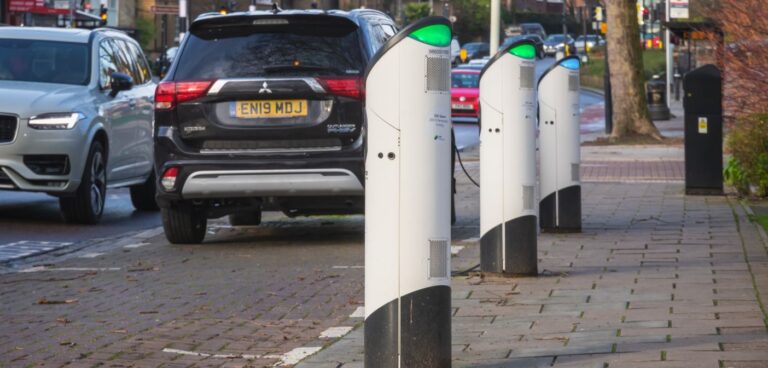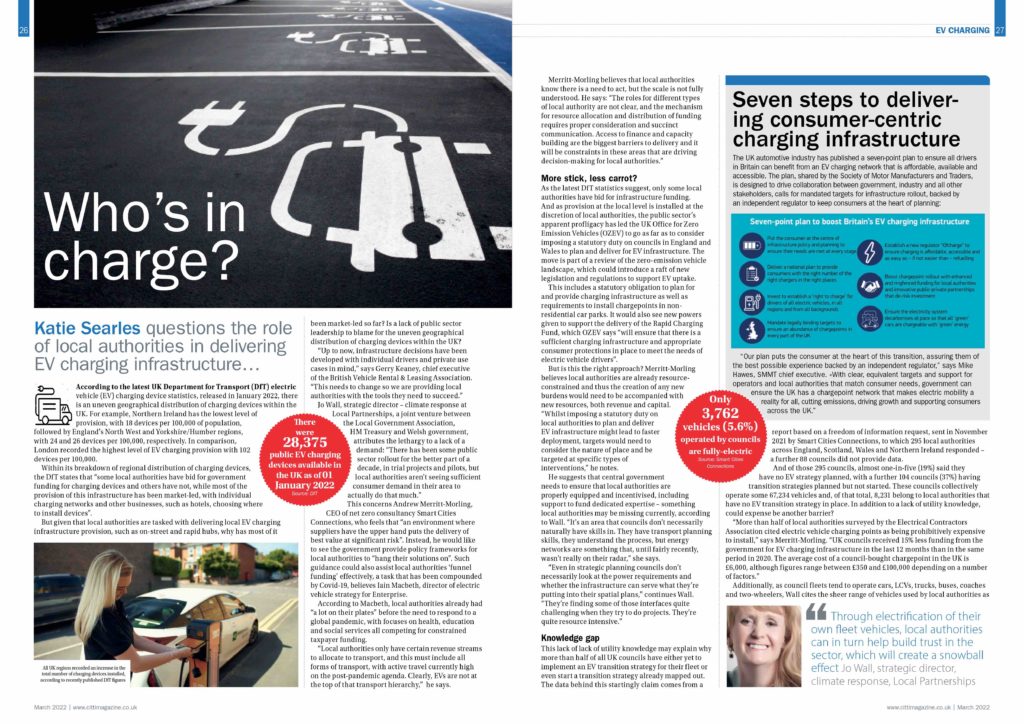The UK’s EV charging network was given a boost today after the government unveiled plans to reach 300,000 public EV chargepoints by 2030 – equivalent to almost five times the number of fuel pumps on the country’s roads today.
Backed by £1.6bn, under the Electric Vehicle Infrastructure Strategy, charging could become easier and cheaper than refuelling a petrol or diesel car, while new legal requirements on operators will see drivers of EVs able to pay by contactless, compare charging prices and find nearby chargepoints via apps.
The new strategy sets out the government’s aim to expand the UK’s charging network, so that it is robust, fair and covers the entire country – as well as improving the consumer experience at all chargepoints, with significant support focused on those without access to off-street parking, and on fast charging for longer journeys.
Some £500m will be invested to bring high-quality, competitively priced public chargepoints to communities across the UK. This includes a £450m Local Electric Vehicle Infrastructure (LEVI) fund to boost projects such as EV hubs and on-street charging.
A pilot scheme for the LEVI fund launched today will see local authorities bid for a share of £10m in funding, allowing selected areas to work with industry and boost public charging opportunities.
The LEVI funding includes up to £50m to fund staff to work on local challenges and public chargepoint planning – aiming to ensure that any development complements other zero-emission forms of travel, such as walking and cycling.
Meanwhile, the existing £950m Rapid Charging Fund will support the rollout of at least 6,000 high-powered super-fast chargepoints across England’s motorways by 2035. This comes on top of ministers’ pledges to continue addressing barriers to private sector rollout of chargepoints, such as local councils delaying planning permission and high connection costs.
According to the government, chargepoint operators have already committed to installing an additional 15,000 rapid chargepoints across England’s entire road network – a quadrupling of the current offer – and over 100,000 on-street chargepoints by 2025.
UK transport secretary Grant Shapps said: “No matter where you live – be that a city centre or rural village, the north, south, east or west of the country – we’re powering up the switch to electric and ensuring no one gets left behind in the process.
“The scale of the climate challenge ahead of us all is well known and decarbonising transport is at the very heart of our agenda.
“That’s why we’re ensuring the country is EV-fit for future generations by the end of this decade, revolutionising our charging network and putting the consumer first.”
Charging network company BP Pulse also announced today its own plans to spend £1bn on developing charging infrastructure in the UK over the next 10 years, supporting hundreds of new jobs.
The investment will allow BP Pulse to deliver more rapid and ultra-fast chargers in key locations, expand fleet products and services, and launch new home charge digital products and services.
The investment will see BP Pulse:
- Approximately triple the number of public charging points in its UK network.
- Accelerate the roll out of 300kW and 150kW ultra-fast charging points that are able to provide EV drivers up to 100 miles of range in around 10 minutes of charging, depending on the model of EV.
- Upgrade its current EV charging technology across its public charging network to improve reliability.
Richard Bartlett, senior vice president, BP Pulse, said: “This £1bn investment is vital to provide the charging infrastructure the UK needs. We’re investing to build a world-class network.
“This investment allows us to deliver more. More high-speed charging in dedicated hubs and on existing fuel and convenience sites. More home charging services. And crucial enhancements to our digital technology that will make charging fast, easy and reliable.”
BP Pulse also aims to support the electrification of the UK’s fleet vehicles by helping to accelerate the roll-out of EV charging solutions to UK businesses. It is currently working with one of the UK’s largest fleets, Royal Mail, Uber and emergency services in both London and Scotland.
Alongside the new strategy, the government has additionally launched an automotive roadmap outlining joint government and industry commitments to achieve the decarbonisation of road transport.
It is the first in a series of roadmaps that will be published over the course of the year for each sector of prime minister Boris Johnson’s Ten Point Plan, bringing together the government’s policies designed to help and support the automotive sector in the shift toward greener transport.
You can read more about the challenges facing the UK’s EV charging network in the March 2022 issue of CiTTi Magazine:






